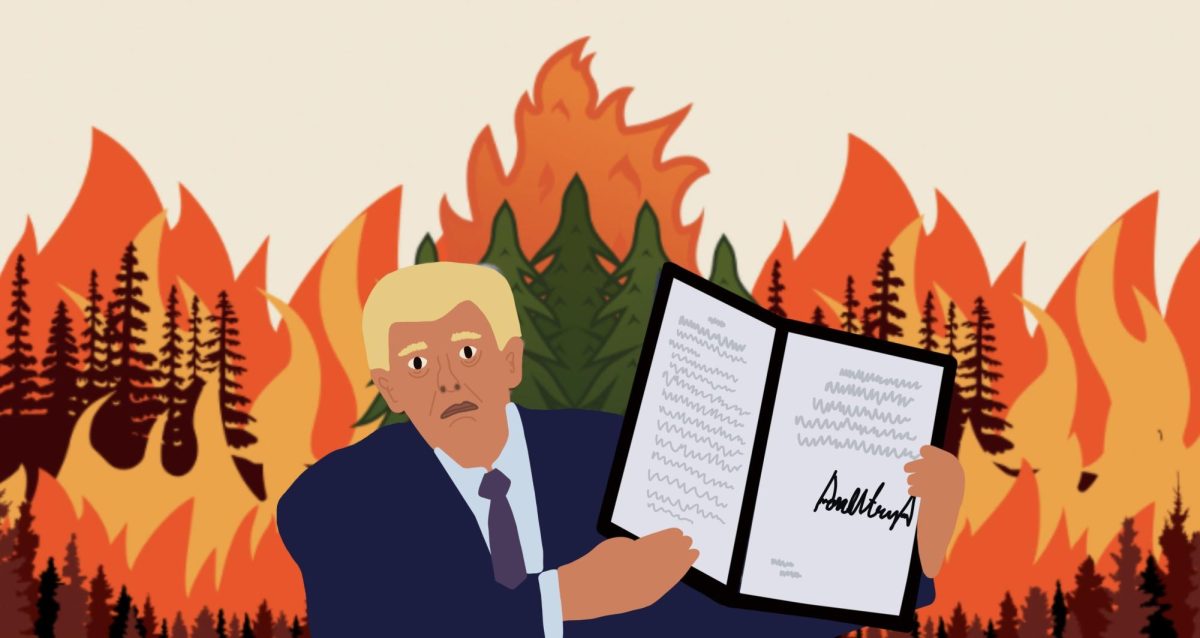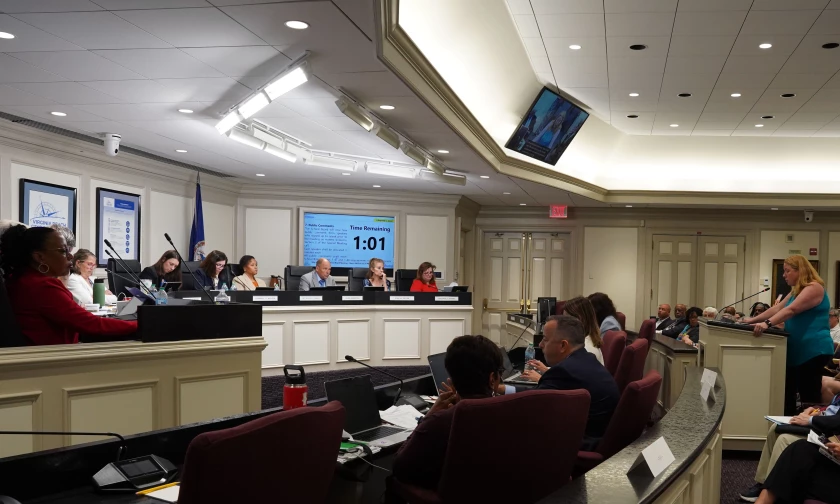One day. Six detrimental climate actions.
On Jan. 20, 2025, President Trump signed an executive order to begin the one-year process of pulling the U.S. out of the Paris Agreement after calling it a “ripoff.” The U.S. had previously withdrawn from the agreement in 2017 under Trump’s direction, but President Biden re-joined the U.S. to the agreement in 2021.
Under the Paris Agreement, nearly every country in the world agreed to work towards a common goal of limiting global warming to 1.5 degrees Celsius (2.7 degrees Fahrenheit) by submitting targets for emission reductions and providing updates on their nation’s progress.
Removing the U.S. from this agreement is just one of several harmful environmentally-focused executive decisions that Trump immediately took upon entering office. Other actions he took include dismantling climate-focused councils, halting renewable energy initiatives, reversing single-use plastic reduction policies, reducing government funding for the EPA and promoting fossil fuel production.
Although alarming, Trump’s actions come as no surprise given his history of undoing the climate conservation progress of Presidents before him. Upon taking office in 2017, he reversed many of President Obama’s initiatives to reduce fossil fuel dependency, such as approving the Keystone XL, Dakota Access pipelines, increasing drilling and reducing corporate taxes to benefit the oil industry.
The administration’s push for fossil fuel expansion, along with Trump’s exclamation on inaugeration day, “Drill, baby drill,” has left millions of Americans concerned for the future.
Oil and gas developments are notorious for their disruption of animal and human ecosystems through oil spills, disruption of migratory patterns and degradation of vital habitats. Additionally, excessive oil drilling releases massive amounts of methane which leads to decreased air quality and various respiratory health issues in humans and animals.
Scientists found that oil and gas wells are emitting toxic particulate matter, carbon monoxide, nitrous oxide, ozone and volatile organic compounds, which affects millions of residents who live near these wells, according to a 2021 Stanford University report from the Science of the Total Environment journal.
The disparity is evident. As Americans get poorer, the pockets of oil companies get richer.
The U.S. currently remains the world’s dominant oil producer and exporter. The top five oil companies collectively gained more than $35 billion in the first quarter of 2021, which is a 200% increase in profits from the previous year, according to americanprogress.org. This jarring increase in revenue for oil institutions explains why the national average cost for a gallon of regular gas reached a new record of $5.01 on June 14, 2022.
As if plans to continue mass drilling for oil didn’t raise enough concern, the administration remains opposed to the Green New Deal, which is a yet-to-be-enacted plan to reach 100% clean, renewable energy by 2030.
Another Trump Presidency poses a substantial threat to the Earth’s rapidly declining climate state, as him and his administration continue to reverse climate regulation policies.
Climate change is taking a toll on West and East Coast communities, exacerbated by rising temperatures and shifting global patterns. Its effects can readily be seen with intensifying California wildfires and North Carolina hurricanes, such as Florence.
With Americans losing hope, many feel the only option left is to focus their energy on ensuring they’re doing their part in limiting their carbon footprint. Therefore, in recent years, transitioning to a zero-waste lifestyle has gained large popularity on social media.
The ‘Zero Waste’ movement originated in the early ’80s with Daniel Knapp’s concept of Total Recycling. It encourages consumers to be more mindful of their lifestyle choices while acknowledging that it’s extremely difficult to live a life with absolutely zero waste production.
Although personal goals to reduce plastic are a great start towards raising awareness, holding large corporations accountable for their alarming contributions to global warming is far more effective than individual efforts alone, and must remain the primary focus of action. The top 15 U.S. food and beverage companies emit 630 million tons of greenhouse gas emissions per year, compared to 16 tons by the average American, according to The Natural Resources Defense Council (NRDC).
“While individual efforts like bringing your own bags to the grocery store help, it’s a small act when you consider the percentage of products sold within the grocery store that come wrapped in plastic,” oceanography and environmental studies teacher Nicholas DiNapoli said.
DiNapoli’s point brings great discussion to how even with people focusing on reducing their carbon footprint, it’s still not enough when it comes to the U.S.’s capitalist economy being the leading contributor to the country’s global warming. Since 1988, 100 companies alone are responsible for 71% of global greenhouse gas emissions, according to NRDC.
Similar to the zero waste movement, DiNapoli’s goal as a teacher is to encourage students to be aware of how their choices impact the environment. He has his students take a carbon footprint test to draw attention to their usage, while also recognizing that the solution lies in the hands of policymakers.
“I don’t intend for students to feel guilty or awful about whatever their carbon footprints turn out to be, but I do think it does a good job of showing you, myself included, just how significant our carbon emissions can be and how we, Americans, compare to the rest of the world,” DiNapoli said.
With last year being the hottest year in ever-recorded history, and with the U.S.’s being one of the leading historical producers of global CO2 emissions, now is certainly not the time to be shifting focus away from mitigating global warming.
Although Trump’s efforts don’t prove to be promising for the climate’s protection ahead, there are many Americans who care about the future of the planet.
Giving up on the government this early is not an option. The fight for preserving the planet has only begun.
Faith can no longer be left in the hands of greedy policymakers; it must lie in the hands of those affected by their decisions. When united in pursuit, educators, scientists, activists, mothers, children, students, workers, voters and citizens alike have the power to make change by advocating for the implementation of policies that favor the future over making the ultra-wealthy wealthier.













Anonymous • Feb 21, 2025 at 11:33 pm
I would suggest you watch Chris Wright’s Ted Talk.
The Green New Deal is nonsensical because many clean energy sources aren’t reliable. Germany switched a majority of its energy to renewable and had to revert half of it due to its inefficiency.
Similarly, the Paris Agreement self-restricts our ability to profit off of our natural resources.
I think Chris Wright put it best, “Energy is hard,” you cannot rush it without messing something up, and that mess could be extremely catastrophic.